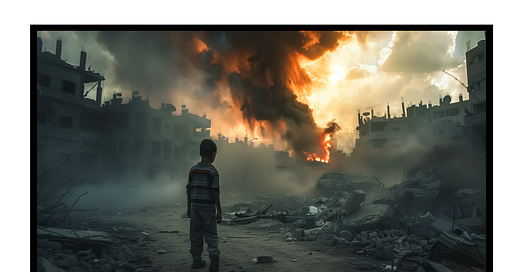The following is a translation from Arabic of an article by the author published in Qatar’s Al-Raya Newspaper on May 1, 2024 1 …
As the conflict in Gaza escalates, the world watches the vacillating fortunes of diplomatic efforts between hope and despair. During his Middle East tour, U.S. Secretary of State Antony Blinken highlighted the “complexities of achieving lasting peace in a region plagued by decades of conflict.” Amidst this escalation looms the imminent threat of an Israeli ground operation in Rafah—a scenario that could significantly exacerbate the humanitarian crisis in Gaza.
The relentless Israeli bombardment of Rafah has not only ravaged the city but also pushed its residents to the brink. In this context, pivotal negotiations are underway where a Hamas delegation “might” head to Egypt 2. These talks, mediated by Qatar and the United States, represent a critical juncture: they could either prevent a potential ground attack or fail, which many fear would lead to catastrophic outcomes.
Throughout April, dialogue between Hamas and the Israelis, facilitated by various intermediaries, yielded little tangible results. However, the current rounds of talks in Cairo hint at progress, with proposals for a phased ceasefire beginning with a prisoner exchange. Yet, fundamental disagreements remain.
Amidst these charged negotiations, Israeli domestic politics further complicates the situation. Prime Minister Benjamin Netanyahu faces significant pressure from his far-right government. Figures like National Security Minister Ben-Gvir and Finance Minister Smotrich have threatened to dismantle the government if any concessions are made to Hamas. This internal division starkly contrasts with the views of opposition figures like Benny Gantz and Yair Lapid, who prioritize the swift release of hostages.
On the Arab front, Blinken’s meetings revealed Arab states’ reluctance to commit “peacekeeping” troops or funds without clear Israeli commitments to a viable two-state solution. This reflects deep concerns among Arab ministers for a definitive pathway to a Palestinian state before any intervention to maintain peace.
Final Note…
The situation in Gaza is not just a regional issue but a test of the international community’s resolve to foster peace in one of the world’s most persistently troubled regions. As diplomacy shuttles between capitals and proposals are exchanged, the lives of millions hang in the balance, waiting for a world often so preoccupied with geopolitical strategies that it overlooks the human cost of inaction.
(No peace without concessions, no concessions without courage.)






